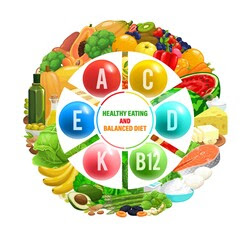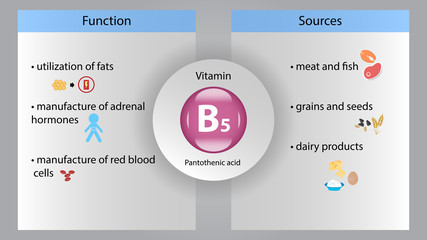Water soluble vitamin B5, B6, B7, B9,
Vitamin b5 or pantothenic acid in many biochemical reactions (production of lipids, red blood cells, steroid hormones and neurotransmitters.)
It also serves as a part of enzyme. The RDA of vitamin B5 is 5micro g/day for both men and women.
Clinical manifestation of vitamin B5 deficiency;
- Fatigue and general weakness
- Irritability or mood changes
- Sleep disturbances
- Nausea and vomiting
- Stomach cramps
- Numbness and burning sensations in the hands and feet
- Muscle cramps
Good source of vitamin B5
Meat: Chicken, beef, and turkey are good sources. Liver and kidney meats, in particular, have high levels.
Fish: Salmon and lobster are particularly high in vitamin B5.
Whole Grains: Products made from whole grains can be a good source of B5, unlike their refined counterparts.
Dairy Products: Milk, cheese, and yogurt all contain vitamin B5.
Eggs: Particularly in the yolk.
Vegetables: Mushrooms, broccoli, avocados, and sweet potatoes.
Legumes: Peas, lentils, and beans.
Nuts and Seeds: Particularly sunflower seeds.
Fortified Foods: Some cereals and beverages are fortified with B vitamins.
Please remember that the body's daily requirement for vitamin B5 is relatively low (5 mg for adults), and deficiencies are rare in developed countries because it's present in so many different foods. Always consult a doctor or a nutritionist if you're considering dietary changes or supplements.
Strengthens of immune system
Promotes healthy skin and hair
Stimulates adrenal hormones'
Maintain healthy nerve system
Provide relief from body fatigue
Reduce stress
Builds up stamina
Help to increase hemoglobin levels
VitaminB6;
Vitamin B6 is present in three different forms; pyridoxal pyridoxine and pyridoxamine. It is the part of coenzymes: PLP (pyridoxal phosphate) and PMP (pyridoxamine phosphate), which are essential in the metabolism of fatty acids and amino acids.
Moreover, vitamin B6 help in the conversion of tryptophan to niacin and serotonin along with production of red blood cells.
The RDA of vitamin B6 for adults is 1.3-1.7micro g /day for males and 1.2-1.5 micro g/day for women.
Clinical manifestation of vitamin B6;
deficiency; Inadequate intake of vitamin B6 diminished the synthesis of neurotransmitters and disturb tryptophan metabolism. The clinical symptoms of its deficiency are classified at under .
Blood; Microcytic anemia/small cell type anemia which is a'' condition in which small ,often hypochromic ,red blood cells are present in a peripheral blood smear that is identified by a low Mean Corpuscular Volume(MCV).
Neurological; Depression, condition, abnormal brain wave pattern(venous malformations causing multiple irregular connections between veins), convulsions (sudden, violent or irregular movement of the body due to involuntary muscles contractions).
Skin; Scaly dermatitis(round red scaly patches on limbs or trunk)
Vitamin B6 toxicity;
The abuse of vitamin B6 supplement cam exhibit toxicological symptoms related to neurological system (headache ,irritability, depression, fatigue, irreversible nerve damage leading to convulsions ) skin abrasions.
Source of Vitamin B6:
Vitamin B6, also known as pyridoxine, is an essential nutrient that the body requires for various functions. This vitamin is a part of the vitamin B complex group, and it's involved in the metabolism of proteins, fats, and carbohydrates. It is also vital for brain development during pregnancy and infancy, as well as immune function.
The main sources of vitamin B6 are:
Poultry: Chicken and turkey are high in B6.
Fish: Such as salmon and tuna.
Organ meats: Such as liver, kidney, heart.
Potatoes and other starchy vegetables.
Fruits (other than citrus).
Fortified cereals and grains.
Beans and legumes.
Nuts and seeds.
Benefit of vitamin B6;
Protect against heart and kidney disease
Boost immune system and improve metabolic rate
Beneficial in treating premenstrual syndrome
Help make red blood cells which carry oxygen
Help to treat stress and depression
Balance blood sugar
Helps normal rain function
Vitamin B7;
Vitamin B7 (vitamin H or biotin) has a vital role in metabolic processes yielding energy.
The AI of vitamin B7 for adult is 30 micro g /day.
Vitamin B7, also known as biotin, is a water-soluble vitamin that is part of the B-complex family of vitamins. These vitamins are essential for various metabolic processes within the body, including the metabolism of fats, carbohydrates, and proteins.
Biotin acts as a coenzyme in the body that's needed for the metabolism of fatty acids, amino acids, and glucose. This means when we eat foods that are sources of fats, proteins, and carbohydrates, vitamin B7 is vital in converting and utilizing these macronutrients for bodily energy, to carry out physical activities and for proper psychological functions.
In addition to these metabolic roles, biotin has other functions in the body. For instance, it is essential for the maintenance of skin, hair, and nails, contributing to their health and vitality. Biotin can assist in the growth of healthier and stronger hair and nails. This is why biotin is often found in many cosmetic products and health supplements for hair and nails.
Biotin also plays a significant role in maintaining a healthy nervous system. It is essential for neurotransmitter function and nerve signal conduction, contributing to mental health and cognitive function.
Clinical manifestation of vitamin B7 deficiency:
Vitamin B7 or biotin deficiency occurs rarely. However ,the main reason for its deficiency is the intake of raw eggs.
Hair loss or thinning, brittle hair
Dry and scaly skin
Cracks in the corners of the mouth (angular cheilitis)
Swollen and painful tongue
Dry eyes
Loss of appetite
Fatigue
Insomnia
Depression
Causes of biotin deficiency may include prolonged use of certain medications, malabsorption disorders, prolonged diet of raw egg whites (which contains a protein that inhibits the absorption of biotin), and rare inherited metabolic disorders like biotinidase deficiency.
Source of vitamin B7
Here are some of the best sources of vitamin B7:
Organ meats (such as liver and kidney)
Egg yolk
Nuts and seeds (like almonds, peanuts, and sunflower seeds)
Salmon and other fish
Dairy products (like milk and cheese)
Avocados
Sweet potatoes
Yeast
Bananas
Broccoli
As always, it's best to consume a balanced diet to ensure you're getting an appropriate amount of all necessary nutrients. If you believe you may be deficient in biotin or any other vitamin, it is important to discuss your symptoms with a healthcare provider before beginning any kind of supplement regimen.
Benefit of vitamin B7
Maintains good health of skin and hair
Helps maintain blood sugar levels in body
Aids in weight loss and stimulating metabolism
Beneficial for growth and maintenance of muscle tissue
Good for ensuring proper functioning of heart
In summary, Vitamin B7 or biotin is an essential vitamin required by the body for various functions, including metabolism, skin, hair, and nail health, and the proper functioning of the nervous system. Despite its importance, the body does not produce biotin, so it needs to be sourced from the diet. Eating a balanced, varied diet is typically enough to provide the body with the biotin it needs.
Vitamin B9:
Vitamin B9 or pteroyglutamic acid, also termed as folate, folacin and folic acid plays a significant role in DNA synthesis, thus is essential for the formation of new cells. Vitamin B9 derivatives also serves as coenzymes; THF and DHF. The RDA of folate is 400micro gram/day for adult men and women.
Clinical manifestation of vitamin B9 deficiency:
Vitamin B9 deficiency may results owing to inadequate dietary intake, impaired absorption and unusual metabolic needs. Folate deficiency may impair protein synthesis and cell division and thereby retarding growth.
The primary outcome of folate deficiency is Megaloblastic and macrocytic anemia. Moreover, low folate intake can lead to GI tract alteration, thus making GI tract a victim of folate deficiency.
Other symptoms of folate deficiency include elevated homocysteine level, headache, irritability, fatigue, weakness, mental confusion and smooth red tongue. Toxicity of Vitamin B9 can be the outcome of supplemental.
abuse. No toxicity is reported from folate intake through natural food sources alone. However, excessive intake through supplements or fortified foods can reach to level high enough to exhibit toxicity, which can mask vitamin B12 symptoms and delay diagnosis of neurological damage.
Benefit of vitamin B9;
Reduce risk of strokes in brain
Help to prevent cancer and heart disease
Reduce risk of neural defects in babies
Help to control cholesterol level
Beneficial in synthesis of DNA in body
Help to improve level of hemoglobin in human body
Protect against cardiovascular disorders
Vitamin B12:
Vitamin B12 or cobalamin is identified by presence of cobalt and is the precursor of two active forms of coenzyme ( methyl cobalamin and deoxyadenosylcobalamin).
The absorption f vitamin B12 can be enhanced by presence of intrinsic factor, a glycoprotein. The activation of folate and vitamin B12 is dependent on each other. The RDA of vitamin B12 for both men and women are 2.4micro gram/day.
Clinical manifestation of vitamin B12 deficiency:
The vitamin B 12 deficiency is not mainly attributed to poor dietary intake but poor absorption. The inadequate absorption may be result of either lack of hydrochloric acid or lack of intrinsic factor.
Another cause of deficiency is Atrophic gastritis ( inflammation of mucosal membrane of stomach) which damage stomach cell lining leading to impaired absorption even if the diet contain adequate amount.
One of the main disease of vitamin B12 deficiency is pernicious anemia ( a blood disorder characterized by abnormally large and immature red blood cell) which id triggered by lack of intrinsic factor or atrophic gastritis.
Apart sore tongue, hypersensitivity of skin, fatigue and peripheral nerves degeneration are other signs of vitamin B12 deficiency. Toxicity has been not reported yet.
Source of vitamin B12 ;
Vitamin B12 benefits;
Help create new red blood cells
Support healthy brain function
Calcium absorption /bone density
Support positive mood
Improve metabolism/energy boost
Cancer protection
Aids in digestion
Prevent memory loss
Vitamin C:
Vitamin C also called ascorbic acid is a white crystalline compound. It is synthesized by plants and most of the animal species from carbohydrate precursor namely glucose and galactose.
Vitamin C activity is exhibited by two of its forms ; a reduced form (l-ascorbic acid) and an oxidized form (L-dehydroascorbic acid). Is ascorbic acid another form used as preservative in food has no biological value in humans.
Ascorbic acid is most sensitive to processing among all the vitamins.
Principally, ascorbic acid in the formation of collagen, an abundant protein that forms the intercellular substances in vascular epithelium, dentin, bone matrices and cartilage. It can reduce the ferric iron to its most efficiently absorbed from i.e. ferrous iron, thus improving the iron absorption .
Ascorbic acid as an important antioxidant that may protect fat-soluble vitamins (vitamin A and E ) and PUF As from oxidation. Its RDA for adults is 90 mg/day for males and 75 mg/day for women.
Clinical manifestation of vitamin C deficiency:
Vitamin C deficiency can lead to defective formation of intercellular cement substances i.e. ceramide in the skin. Growth retardation, irritability, anemia, poor wound healing, lowered immunity, fleeting joint pains (migratory arthritis) and shortness of breath are among the signs of its deficiency.
When there is severe deficiency of vitamin C, scurvy ''deterioration of blood vessels'' occurs that results in hemorrhage, bruising, loose teeth, increased risks of bone fracture and bleeding gums. Large dose of vitamin C has toxic effects such as nausea, abdominal cramps and diarrheas'.
Source of vitamin C;
Benefit of vitamin C;
Cure for the common cold
Protection against the immune system deficiencies
Prevent cardiovascular diseases
Maintain healthy skin and wrinkling
Important for eye health
Prevent cancer and stroke
Decrease hyper tension
Essential for the body to make collagen
All B vitamin water soluble?
What are fat soluble and water soluble vitamin?
Why vitamin c is water soluble
What is good source is water soluble vitamin?






















0 Comments
please do not enter spam link in the comment box.